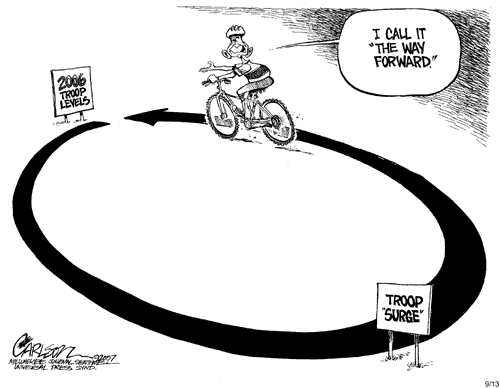Sunday, September 30, 2007
NYT: Bombings in Iraq Said to Signal Ramadan Offensive


A house engulfed in smoke and flames after a car bombing in Baghdad on Wednesday, when seven such attacks occurred across Iraq.
Bombings in Iraq Said to Signal Ramadan Offensive
BAGHDAD, Sept. 26 — A surge in suicide and car bombings in Iraq this week is evidence that militants have begun an offensive they had threatened for the holy month of Ramadan, an American general said Wednesday.
Seven car bombs were detonated throughout the country on Wednesday alone, adding to a rise in attacks that began Monday. The outbreak was a departure from recent weeks, though American officials maintained that the increased troop levels this year were still proving effective in tamping down violence.
"We have seen an upturn in levels of violence in the last few days," Brig. Gen. Kevin Bergner, a spokesman for the military, said Wednesday at a news conference in the Green Zone here. "We know this is a specific period of time when the extremists, in the past, and we know this year, will try to increase the levels of violence."
In the deadliest attack on Wednesday, 32 people were killed and many more wounded by two car bombs on a busy shopping street in Bayaa, a Sunni and Shiite neighborhood in western Baghdad, the Interior Ministry said. The explosions were timed to kill people shopping for groceries before the evening iftar feast, the meal to break the daily fast of Ramadan.
In a favorite extremist tactic, the bombs were detonated about a minute apart, with the second exploding in the path of people fleeing the scene of the first. Sunni extremist groups have posted warnings on militant Web sites that Ramadan would be particularly violent, repeating a well-established pattern. On Tuesday, they claimed responsibility for a series of attacks on police chiefs, police officers, Interior Ministry officials and tribal leaders.
In Mosul, a Sunni town north of Baghdad, car and truck bombers took to the streets and struck targets before a curfew was imposed at 1:30 p.m., a local police official said. One of the bombers drove a truck into the construction site for a courthouse and detonated his explosives, killing at least three people and wounding about 40, the American military said.
Farther north, a car bomb detonated outside the home of a tribal sheik in Um al Dibaben, a village near the Syrian border, killing 10 people and wounding five. The sheik, Kanan al-Juhaimur, survived.
The outburst of violence served notice that extremist groups were still capable of doing considerable damage, General Bergner said, even as they were constrained by the additional American troops in Iraq.
"Al Qaeda in Iraq continues to use indiscriminate violence," he said, referring to the homegrown Sunni extremist group that American intelligence officials say is foreign-led.
"They continue to try to achieve a spectacular attack that would incite sectarian violence."
Also on Wednesday, the United States military showed reporters two roadside bombs disguised as rocks that General Bergner said were probably from Iran. They were discovered in a buried cache south of Baghdad, he said.
The first was described as one of the armor-piercing shaped charges, cones of metal wrapped in high explosive, that are responsible for most of the deaths of Americans soldiers in Iraq. The other was said to be five explosively formed penetrators, another armor-piercing weapon.
Iran has denied supplying any weapons to Iraqis.
Turkey and Iraq are close to an agreement to allow the Turkish military to chase Kurdish rebels across the countries' shared border, the Turkish television network NTV reported.
Iraq's interior minister, Jawad al-Bolani, in Ankara on an official visit, would not provide any details of the pact. Aidn Khald, an under secretary in the ministry, said the agreement would be signed Thursday, but declined to discuss its terms.
The NTV report said the Turkish Army would be allowed to conduct small-scale, cross-border operations into northern Iraq but only after receiving consent from Iraqi officials.
Turkey has repeatedly asserted a right to raid Kurdish shelters in northern Iraq, if the government of Kurdistan and its American backers do not contain the rebels. A similar agreement, which Turkey signed with Iraq under Saddam Hussein, did not require approval in advance by Iraqi officials.
The Ministry of Health on Wednesday reported the first death in Baghdad from cholera. The victim was a woman who died Sunday, The Associated Press said. The usually preventable disease, which is spreading across Iraq, has killed 12 people.